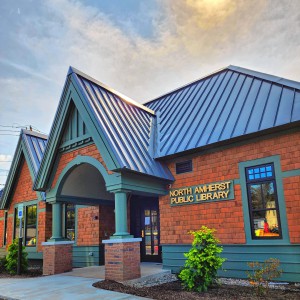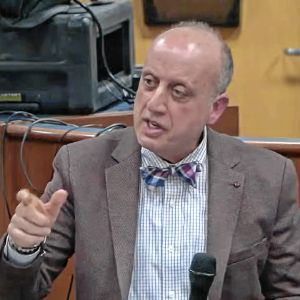Surviving the 1970s: Northampton author’s coming of age novel offers a sardonic look at the era of disillusion and drift
| Published: 06-03-2023 6:47 PM |
Think of the United States in the 1970s, and a number of images come to mind, few of them appealing: disco music; gas shortages; the Watergate scandal; a U.S. president citing a “crisis of confidence” among Americans; a last helicopter lifting off the roof of the U.S. embassy in Saigon as the former South Vietnam was overrun by the North Vietnamese army.
As the New Yorker wrote about the seventies several years ago, it was a decade marked by “a mood of cynicism and farce… a shapeless, burned-out interregnum between the high dramas of the sixties and the bright, hard edges of the Reagan era.”
If you came of age in the 1970s, though, you might still feel an emotional connection to that time, even if you recognize some of the bleaker elements of the era.
In his novel “The Nothing Brothers,” Northampton author Jeff Rosen recalls his teenage years living north of New York City in the 1970s as a time when he and his friends “were flying all over the place. We didn’t know what we were doing or where we were going… but we knew we didn’t want to follow in our parents’ footsteps.”
The book offers an often raucous profile of teens, including the central character, Leo Kraft, bucking restraints at home and at school, arguing fiercely over music, trying to unravel the mysteries of the opposite sex (read: women) and finding places to smoke pot.
There’s a fair amount of a familiar teenage American ritual in play: tooling around in cars, looking for something to do. The teens also go to rock concerts, or they attend parties in homes where no adults are around and mayhem sometimes follows.
All the while, they rebel against their suburban existence and their parents’ “conformity” by mocking everything and everyone around them, including each other – by calling themselves The Nothing Brothers.
Rosen, who teaches urban and environmental policy & planning at Tufts University’s Graduate School of Arts and Sciences, says his novel is based on some of his own experiences and that of his friends; he grew up in a town in Rockland County, about 35 miles north of Manhattan.
Article continues after...
Yesterday's Most Read Articles
 A Waterfront revival: Two years after buying closed tavern, Holyoke couple set to open new event venue
A Waterfront revival: Two years after buying closed tavern, Holyoke couple set to open new event venue
 ‘We can just be who we are’: Thousands show support for LGBTQ community at Hampshire Pride
‘We can just be who we are’: Thousands show support for LGBTQ community at Hampshire Pride
 3-unit, 10-bed house in backyard called too much for Amherst historic district
3-unit, 10-bed house in backyard called too much for Amherst historic district
 ‘Home away from home’: North Amherst Library officially dedicated, as anonymous donor of $1.7M revealed
‘Home away from home’: North Amherst Library officially dedicated, as anonymous donor of $1.7M revealed
 UMass basketball: Matt Cross announces he’s transferring to SMU for final year of eligibility
UMass basketball: Matt Cross announces he’s transferring to SMU for final year of eligibility
 Retired superintendent to lead Hampshire Regional Schools on interim basis while search for permanent boss continues
Retired superintendent to lead Hampshire Regional Schools on interim basis while search for permanent boss continues
But “The Nothing Brothers” is not an autobiography, he adds.
“The main characters are amalgams of some of the people I knew, and I certainly drew on my own memories and experiences,” he said during a recent phone call. “But it is, in the end, a novel.”
What Rosen particularly recalls from his adolescence – he graduated from high school in 1980 – is not wanting to be like his parents, even though he didn’t know what he wanted to do himself and he initially resisted his parents’ push for him to go to college.
“We had an almost knee-jerk reaction against conformity in those days,” said Rosen. “My dad worked in the Garment District (in NYC) and would leave the house every day at 6:45 a.m., and he didn’t get home til after 6:30 p.m. And I would think ‘That is not a path I want to follow.’”
Rosen did find his own way. He’s a graduate of Cornell University and the University of Maine, and he previously was the CFO of the Solidago Foundation, a nonprofit Northampton group that funds grassroots organizing.
And Rosen also remembers the seventies as an era that seemed to offer a more progressive future, with the Vietnam War finally over, the women’s movement advancing, dress codes and sexual restrictions loosening, environmental awareness growing, and more.
But at some point, he said, “We looked around and those progressive values we assumed would keep coming didn’t make it. What happened?”
Rosen, in fact, wrote a much earlier version of his novel (then called “Voices of Leo”) that he started about 40 years ago when he was in college. Then he let it languish for years, only to resurrect it in 2017 after Donald Trump became president.
Trump’s election “seemed like a repudiation of everything we had thought was important,” he said. “His message was like ‘We don’t need this progressive stuff, and by the way, it’s OK to hate people.’”
As he writes in an introduction to his novel, “Puzzling over the connection between our failure to make something better and the world we live in today, I returned to the draft, burned it to the ground, and created The Nothing Brothers from those warm ashes.”
“I felt I could bring a lot more perspective and experience to the story than I could in my twenties,” Rosen said. “There’s much more of a narrative arc to the book now.”
Leo, at the center of the story, is an only child who’s not happy about his red hair and even less happy with the constant friction he has with his father, a podiatrist who’s not shy about ticking off his son’s shortcomings, like his mediocre performance at school.
He finds some solace hanging out with his friends, listening to rock and heavy metal and arguing about which bands are best, and by working as a counselor at a summer camp, where he meets his first girlfriend, though their affair has its up-and-downs.
Leo is also much closer to his grandfather, his mother’s father, than to either of his parents, finding him easier to talk to and more accepting of him. And he admires the way his grandfather, who owns some declining real estate in the Bronx, came through the Great Depression and how another older relative, known as Uncle Syd, survived the Holocaust.
“I don’t get it,” Leo says to his grandfather. “It’s like you and Uncle Syd had these big, exciting lives. And then our parents moved here and stopped doing anything.”
His grandfather just chuckles and says “Find your own way, Leo. But don’t let anyone tell you it’s easy.”
Aside from Leo’s struggles to find a girlfriend, some of the book’s funnier scenes come from the fanatical devotion the characters show toward certain bands — Aerosmith, Ted Nugent, The Who, Led Zeppelin — as well as the bottomless loathing they can summon for music they don’t like. It’s a good reminder of the intense emotions that can rule the teenage years.
At one point, trying to woo a girl he likes, Leo swallows his hatred of jazz guitarist George Benson when she invites Leo to go to a Benson concert with her. Leo finds it just bearable because “with the recent release of the Saturday Night Fever soundtrack, he was focusing most of his musical hatred… on disco.”
“It’s like we were all desperate for a sense of identity, and we thought we could find that through music,” said Rosen, who remembers few people in his school listened to – or admitted listening to – Bruce Springsteen, because “he was from New Jersey, and we had a definite bias against New Jersey.”
Despite his slipshod approach to school, Leo is actually a more thoughtful guy than he’s willing to admit. At one point the school’s principal calls him into his office to ask how a student with mediocre grades and a bad attitude could do so well on his SATs.
When he’s convinced Leo hasn’t cheated on the test, the principal says “Well, then we’re left to conclude that someone like you has just pissed away their entire academic career. Can we agree on that as well?”
“I guess I’d call it a mutual waste of time,” says Leo.
As the father of three children, the oldest still in high school, Rosen says he’s been happy to see how much better their experience has been in school than his was. “And I think kids are just nicer to each other than we were when we were in school.”
More information about Rosen’s novel is available at nothingbrothers.com.
Steve Pfarrer can be reached at spfarrer@gazettenet.com.

 Easthampton author Emily Nagoski has done the research: It’s OK to love your body
Easthampton author Emily Nagoski has done the research: It’s OK to love your body Earth Matters: Honoring a local hero: After 40 years, Hitchcock Center bids farewell to educator and creative leader, Colleen Kelley
Earth Matters: Honoring a local hero: After 40 years, Hitchcock Center bids farewell to educator and creative leader, Colleen Kelley Valley Bounty: Delivering local food onto students’ plates: Marty’s Local connects farms to businesses
Valley Bounty: Delivering local food onto students’ plates: Marty’s Local connects farms to businesses Let’s Talk Relationships: Breaking up is hard to do: These tools can help it feel easier
Let’s Talk Relationships: Breaking up is hard to do: These tools can help it feel easier
